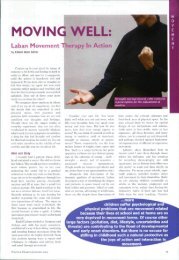Solution-Focused Brief Therapy With Long-Term Problems
Solution-Focused Brief Therapy With Long-Term Problems
Solution-Focused Brief Therapy With Long-Term Problems
You also want an ePaper? Increase the reach of your titles
YUMPU automatically turns print PDFs into web optimized ePapers that Google loves.
Simon & Berg SFBT <strong>With</strong> <strong>Long</strong> <strong>Term</strong> <strong>Problems</strong> Page 9<br />
__________________________________________________________________________________________<br />
Steven: That was what my dad said to do.<br />
Therapist: What other ideas did Dad have that are<br />
helpful to you?<br />
Steven: He said don’t think too much. Don’t sit<br />
around and daydream. Stay busy.<br />
At this point, I asked Steven to scale himself on<br />
an “on track” scale where 10 is on track and 0 is<br />
the opposite. He scaled himself at 10.<br />
Restructuring<br />
Campbell, et. al. 9 write about restructuring:<br />
Many clients have defined the<br />
problem in ways that limit solutions,<br />
e.g. chemical imbalance, abusive<br />
partners, misbehaving children or a<br />
diagnostic label. <strong>Solution</strong>-focused<br />
therapy uses questions to create<br />
awareness of options. Restructuring<br />
statements are effective tools in this<br />
process. . . While the team offers<br />
possible options for thinking<br />
differently, it is the client who actively<br />
restructures his or her own thinking<br />
(p. 7).<br />
The authors further clarify the definition<br />
of restructuring:<br />
Our use of this word is not related to<br />
a belief in a deeper psychic structure,<br />
but rather to how clients come to<br />
think differently about themselves and<br />
their problems (p. 7).<br />
We have found that clients who have been<br />
treated in conventional mental health services for<br />
many years, define themselves in ways that limit<br />
options. For example, they are told that they have<br />
an illness which needs to be managed, similar to<br />
diabetes. They need to maintain a minimum of<br />
stress, and to have “realistic” aspirations for<br />
themselves.<br />
In one particular poignant session, Steven<br />
spoke of his diagnosis, stating that he has an<br />
illness and knows that he is schizophrenic. Steve<br />
de Shazer 1 writes about this issue:<br />
“Schizophrenia” started out as the<br />
name of a concept and subsequently<br />
has become reified and thus is<br />
frequently read or interpreted as<br />
static, as not changing over time. The<br />
term is usually read to mean that cure<br />
is impossible: Only remission is<br />
possible and therefore relapse is<br />
always lurking around the corner (p.<br />
108).<br />
<strong>Solution</strong>-focused therapy co-constructs<br />
possibilities with the client. Diagnoses, especially<br />
diagnoses such as “schizophrenia,” imply<br />
disability. <strong>Solution</strong>-focused therapy focuses on<br />
what clients do to improve their situation.<br />
When the therapist had returned from<br />
consulting with the team, he said the following to<br />
Steven:<br />
Therapist: Well, we certainly had a<br />
lively discussion back there, Steven.<br />
I think the first thing we want to<br />
say is the only use we find in any<br />
diagnosis is that it gets us paid.<br />
We’ve worked with you a long time<br />
and have been impressed with how<br />
you think, how you’ve figured out<br />
how to make your life better and<br />
keep yourself on track. We don’t<br />
see you as your diagnosis. We just<br />
see you as Steven.<br />
Steven: That’s the first time anyone ever said that<br />
to me.<br />
It’s obvious from this brief excerpt to see how<br />
years in the conventional mental health system<br />
have served to, using de Shazer’s language, reify<br />
the diagnosis for Steven. As the sessions went by,<br />
Steven began to talk differently about himself; he<br />
began to report being able to see the normal things<br />
that he does. In one particular session Steven<br />
said, “I say I have more of a sound mind now.”<br />
Significantly, those who had known Steven for<br />
many years, those in varied mental health













